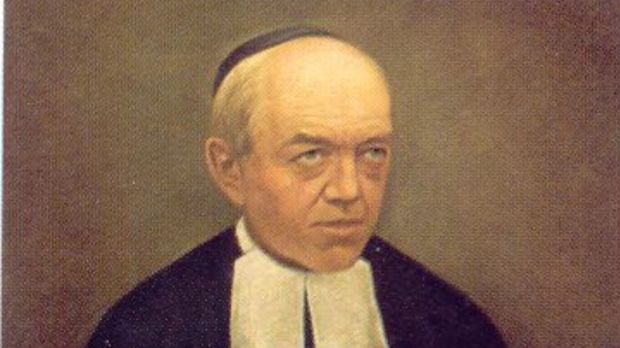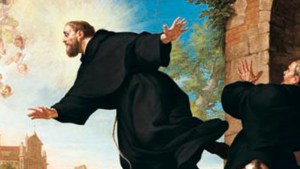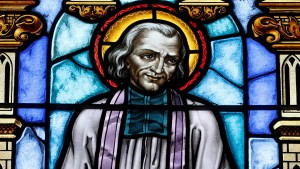It’s a mistake to imagine that you have to do great things to become a great saint. The simple story of little Brother Mutien-Marie proves otherwise. We need examples like his, because otherwise we could too easily claim that we God hadn’t given us the talents we needed to become a saint!
Louis-Joseph Wiaux was born in Mellet, Hainaut (Belgium), on March 20, 1841. This region of Belgium is Catholic, anchored in faith and religious practice. His father was a blacksmith and his mother ran the village’s only store and café. Together, they raised six children, attended mass every day, had a deep devotion to the Eucharist, and prayed the Rosary every spare moment.
An early vocation
Far from seeming a chore to Louis-Joseph, these customs were a source of joy and balance for him. This explains why the little boy, when at school, revealed himself to be an ardent devotee of the Sacred Heart and of the Blessed Virgin Mary. In fact, he was too pious in the eyes of his classmates. They nicknamed him “St. Aloysius Gonzaga,” an allusion to the young Jesuit saint set as an example by Catholic educators.
It may have been due to that, or more likely the fact that one of his older brothers had entered the Jesuit juniorate, but by the end of his primary education, the boy was thinking of joining the sons of St. Ignatius. However, his parish priest dismissed this vocation immediately, not believing him capable of meeting the Jesuits’ requirements. Certain, nevertheless, that Louis-Joseph had heard the divine call, the priest directed him to the Brothers of the Christian Schools. They were also educators, but their intellectual ambitions better matched the teenager’s abilities.
A notable lack of skills
In 1856, Louis-Joseph was admitted to the novitiate in Chimay, then continued his training at the Saint George College in Brussels. On September 11, 1859, he was sent from Malonnes to near Saint-Berthuin, where he remained until his death.
However, despite having taken his temporary vows on September 14, the 17-year-old, who took the religious name of Br. Mutien-Marie, immediately proved unfit for the vocation to which he had been directed. The Brothers of the Christian Schools are teachers and, even if at the time they devoted themselves essentially to the primary education of children from modest backgrounds who would soon be dropping out of school, they still need teaching skills. But Br. Mutien-Marie didn’t have them…
Was he too young? Had his training been insufficient? Discouraged, the superiors considered sending him away, not seeing what to do with such an incompetent man. One of the teachers, though, was touched by his distress at the prospect of being dismissed. He convinced those in charge to keep him, confining him to tasks commensurate with his lack of talent.
Brimming with good will
He couldn’t teach academic subjects, but he could supervise studies. Some simpler subjects, such as teaching music or drawing in small classes, might be right for him. It soon became apparent that Mutien-Marie was not artistically inclined, but was brimming with goodwill.
I asked the Blessed Virgin Mary to accompany me always and everywhere, so that I would always be at her side. She gave me this grace.
Told to study music, he took up the challenge. He learned to play the harmonium, organ, bombardon, and other instruments. This enabled him to play an important role in the school choir and orchestra.
He was also granted permission to teach catechism, for he was gifted in this one area. He did this twice a week in the village. Br. Mutien-Marie also taught this subject to children from poor families who benefited from free tuition at the college, a task that some found unpleasant.
He was also entrusted with the task of waking the community every morning at 4:30 a.m., a thankless task that required him to get up earlier than the others, but which he carried out as long as his health allowed.
The brother who prayed all the time
What struck his superiors was his total obedience to their orders, even when they weren’t what he hoped for. Later, one of his companions would say that you could take all the articles of the Rule one by one: there wouldn’t be a single one that Br. Mutien-Marie didn’t observe to the letter throughout his life. That in itself is admirable.
How happy one is when, on the brink of the grave, like me, one has always had great devotion to the Blessed Virgin Mary…
Another remarkable fact is that Mutien-Marie felt he had spare time, since he didn’t teach, so he devoted himself to prayer. The children recognized it, calling him “the brother who prays all the time!”
The pious brother spent hours in front of the Blessed Sacrament, endlessly praying dozens of rosaries. He belonged to the Guard of Honor, an association of people who venerate the Sacred Heart for an hour each day by offering up everything they do out of love. He even had a replica of the Lourdes Grotto built near the school.
His constant prayer struck those who witnessed it, and soon people started coming to entrust their intentions for themselves and others to his prayers. Rumor has it that his prayers were often answered.
At the end of his life, Mutien-Marie would say, “I asked the Blessed Virgin Mary to accompany me always and everywhere, so that I would always be at her side. She gave me this grace.” Such is the secret of his constant prayer, which bore abundant fruits of grace witnessed by many people.
The time of glory
In 1912, his strength declined, forcing him to free himself of all occupations except prayer.
The winter of 1917 in occupied Belgium was bitterly cold, and the hardships immense. Mutien-Marie fell ill. By the end of January, it was clear he was dying. On the eve of his death, he told his confessor, “How happy one is when, on the brink of the grave, like me, one has always had great devotion to the Blessed Virgin Mary…”
He died on the morning of January 30. He was given a humble burial, but by 1926, the influx of pilgrims was so overwhelming that his grave had to be moved. There was talk of healings and miracles. The glory of the “brother who prayed all the time” spread around the world. He was canonized in 1989, without ever having performed any of the extraordinary wonders that many people imagine to be necessary for sanctity.



